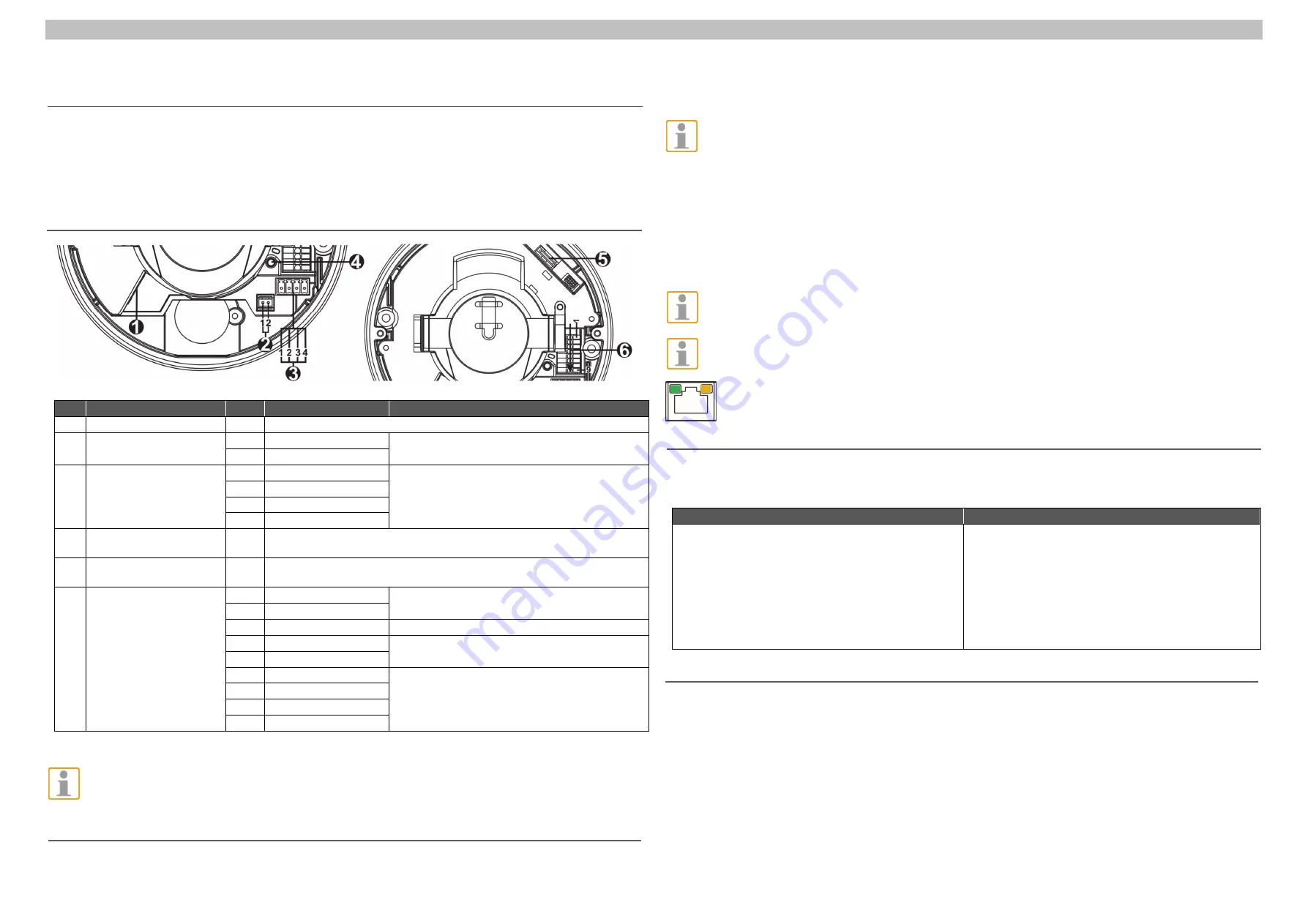
G-Cam/EFD-4230 H.265 IR Rugged Dome IP Camera Quick Guide
2
3
This guide is for quick installing and connecting the G-Cam/EFD-4230 H.265 IR Rugged Dome IP Camera. For more
details, please refer to the User’s Manual at the supplied CDROM.
Installation Notices
This camera must be installed by qualified personnel and the installation should conform to all local codes.
This camera contains replaceable batteries. To prevent explosion risks, confirm the battery type before replacement.
Dispose of used batteries in accordance with the local regulations.
To use an external power supply, please contact the camera manufacturer to confirm that the power supply uses
the same power specifications as the camera. The power supply must comply with the LPS requirements.
Camera’s Connectors
No.
Connector
Pin
Definition
Remarks
1
RJ-45
-
For network and PoE connections
2
BNC*
1
BNC
For analog video output
2
GND
3
Power
(DC 12V / AC 24V)
1
AC 24V-1
Power connection
2
AC 24V-2
3
DC 12V -
4
DC 12V +
4
Default Button
-
Press the default button with a proper tool for at least 20 seconds to
restore the camera.
5
microSD Card Slot
-
Insert the microSD card into the card slot to store videos and snapshots.
Do not remove the microSD card when the camera is powered on.
6
Alarm & Audio I/O
1
Audio In L
Audio In (Line In)
2
Audio In R
3
GND
Ground connection
4
Audio Out L
Audio Out (Line Out)
5
Audio Out R
6
Alarm Out +
Alarm connection
**Do
NOT
connect external power supply to the
alarm I/O connector
of the IP camera.
7
Alarm Out −
8
Alarm In +
9
Alarm In −
*Please contact the manufacturer for the compatible BNC cable.
NOTE:
It is not recommended to record with the microSD card for 24/7 continuously, as it may not be able to
support long term continuous data read/write. Please contact the manufacturer of the microSD card for
information regarding the reliability and the life expectancy.
Camera Cabling
Please follow the instructions below for cable connections.
Power Connection
Please use a DC 12V / AC 24V power adaptor and plug it to the camera and the power outlet. Alternatively, users can
use an Ethernet cable and connect it to the RJ-45 connector of the camera and a Power Sourcing Equipment (PSE)
switch.
NOTE:
If PoE is used, make sure PSE is in use in the network.
Zero Downtime Power Switching (ZDT)
When users connect DC12V power jack and the RJ-45 port at the same time, the power input comes from the RJ-45
connector. If the RJ-45 power source fails, the camera will switch power input seamlessly to the DC12V port until the
RJ-45 power source is restored.
Ethernet Cable Connection
Connect one end of the Ethernet cable to the RJ-45 connector of the camera, and plug the other end of the cable to
the network switch or PC.
NOTE:
In some cases, Ethernet crossover cable might be needed when connecting the camera directly to the
PC.
NOTE:
Check the status of the link indicator and the activity indicator LEDs. If the LEDs are unlit, please check
the LAN connection.
Green Link Light indicates good network connection.
Orange Activity Light flashes for network activity indication.
Before Login to the Camera
A client program will be automatically installed to the PC when connecting to the camera. Before logging in to the
camera, please ensure downloading the ActiveX control is allowed by either changing the ActiveX controls and plug-
ins or setting Internet’s security level to default. For further details, please refer to the User’s Manual.
ActiveX Controls and Plug-ins Settings
Internet Security Level
Step 1:
Start the Internet Explorer (IE).
Step 2:
Select <Tools> from the main menu of the
browser. Then click on <Internet Options>.
Step 3:
Click on the <Security> tab and select
<Internet>, and click on <Custom level> to
change ActiveX settings.
Step 4:
Set “ActiveX controls and plug-ins” items to
<Prompt> or <Enable>.
Step 1:
Start the Internet Explorer (IE).
Step 2:
Select <Tools> from the main menu of the
browser. Then click on <Internet Options>.
Step 3:
Click on the <Security> tab and select
<Internet>.
Step 4:
Down the page, click <Default Level> and click
on <OK> to confirm the setting. Close the
browser window, and open a new one later for
accessing the IP camera.
Camera Login
The default setting of the camera is:
DHCP
. If no DHCP server is in network, the camera sets itself to
192.168.0.250
.
To access the camera in this case, please set the IP address of the PC as: 192.168.0.XXX; for example:
IP Address: 192.168.0.100
Subnet Mask: 255.255.255.0
Login ID and Password
Key in the camera’s IP address in the URL bar of the web browser window and hit on “Enter”.
Enter the default username (
root
) and password (
admin
) in the prompt request dialogue. Note that username is
case sensitive.
Install the ActiveX Control
After connecting to the camera, the request for installing the ActiveX control will appear just below the URL bar.


